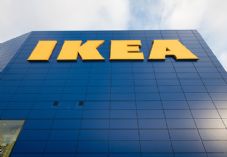UK DIY News
IKEA On Track Towards 2030 Climate Commitment

- IKEA releases Sustainability Report FY21 and confirms being on track towards 2030 climate commitment
The financial year 2021 (FY21)* was a year of both challenges and important movements towards the IKEA 2030 commitments. Although the effects of the pandemic continued, nearly all stores could re-open, and everyday life returned to something more familiar. Important sustainability achievements include improvements throughout the value chain to further reduce the IKEA climate footprint in absolute terms compared to baseline FY16, the launch of an interactive online circular product design tool, and taking a big step towards using only renewable energy across the value chain.
The IKEA Sustainability Report FY21 is issued by Inter IKEA Group and covers the collective efforts from the contributors in the IKEA franchise system and value chain.
In FY21, the total IKEA climate footprint decreased by 1.6 million tonnes of CO2 eq in absolute terms compared to baseline FY16, a reduction of 5.8%, while IKEA sales surpassed previous highs**. This is mainly due to a more energy-efficient IKEA range, more renewable energy in production, and an increased sales share of plant-based food.
“With two-thirds of the time left to 2030, we are on track and have reached one-third of our emission reduction through many short- and medium-term movements. We also have plans in place to address our longer-term movements and remaining complex challenges, such as the climate footprint of the materials used in the IKEA range”, says Lena Pripp-Kovac, Chief Sustainability Officer, Inter IKEA Group. “Climate change, biodiversity loss, and increasing inequalities make us even more determined to speed up our work. And while climate action does present many great opportunities, we also need to secure a just transition with a specific focus on respecting human rights across the value chain.”
Highlights from the financial year 2021 include:
- Increased use of renewable energy across the value chain – reaching 100% renewable electricity in 10 additional IKEA markets, including Russia, securing that all IKEA owned factories only consume renewable electricity globally – and accelerating the transition to renewable electricity with a new programme for 1,600 direct suppliers.
- A new forest positive agenda for 2030, with the aim to enhance biodiversity, support livelihoods and mitigate climate change. More than 99% of the wood used is now FSC certified or recycled wood.
- Increased sales share of plant-based food compared to meat-based options and the launch of SOLHETTA – our significantly more energy-efficient and affordable LED bulb range.
- The launch of affordable solutions that enable people to purify the air at home (such as STARKVIND air purifier) and generate clean energy.
- The launch of an interactive online circular design tool based on learnings from the assessment of 9,500 products in the IKEA range, published on IKEA.com.
- Reached 56% renewable and 17% recycled materials, in total, 73% of the material sourced for the IKEA range is renewable or recycled***.
- More circular ways to care for and pass on IKEA products, including refurbishment and buy-back activities and providing more than 18 million spare parts.
- Joining the Science-based Targets for Nature Corporate Engagement Program and preparing to map the biodiversity impact of the IKEA value chain in FY22.
- The next generation of IWAY in place, the IKEA way of responsibly procuring products, services, materials and components.
- Submitting an action pledge in support of the UN initiative designating 2021 as the International Year for the Elimination of Child Labour.
“The IKEA vision to create a better everyday life for the many people is more relevant than ever, says Jon Abrahamsson Ring, CEO, Inter IKEA Group. “We continue the work to make our offer more sustainable and affordable. We are phasing out less sustainable products and materials and are introducing new options. One good example is replacing virgin polyester with recycled polyester, resulting in a reduced climate footprint from polyester use by 45% in FY21. Another example is the introduction of VÄRLDSKLOK, a new plant-based mince.”
The IKEA People & Planet Positive sustainability strategy outlines the ambitions and commitments, creating a common agenda towards 2030. More examples of progress against the sustainability strategy are to be found in the IKEA Sustainability Report FY21 and the first-ever IKEA Climate Report FY21. These reports show progress from across the entire IKEA value chain, including Inter IKEA Group, the 12 franchisees and the many suppliers. Each part of the IKEA business sets goals and road maps to deliver on the strategy and to allow for locally tailored and relevant activities.
Source : IKEA
Thank you for the excellent presentation that you gave at Woodbury Park on Thursday morning. It was very interesting and thought-provoking for our Retail members. The feedback has been excellent.











































